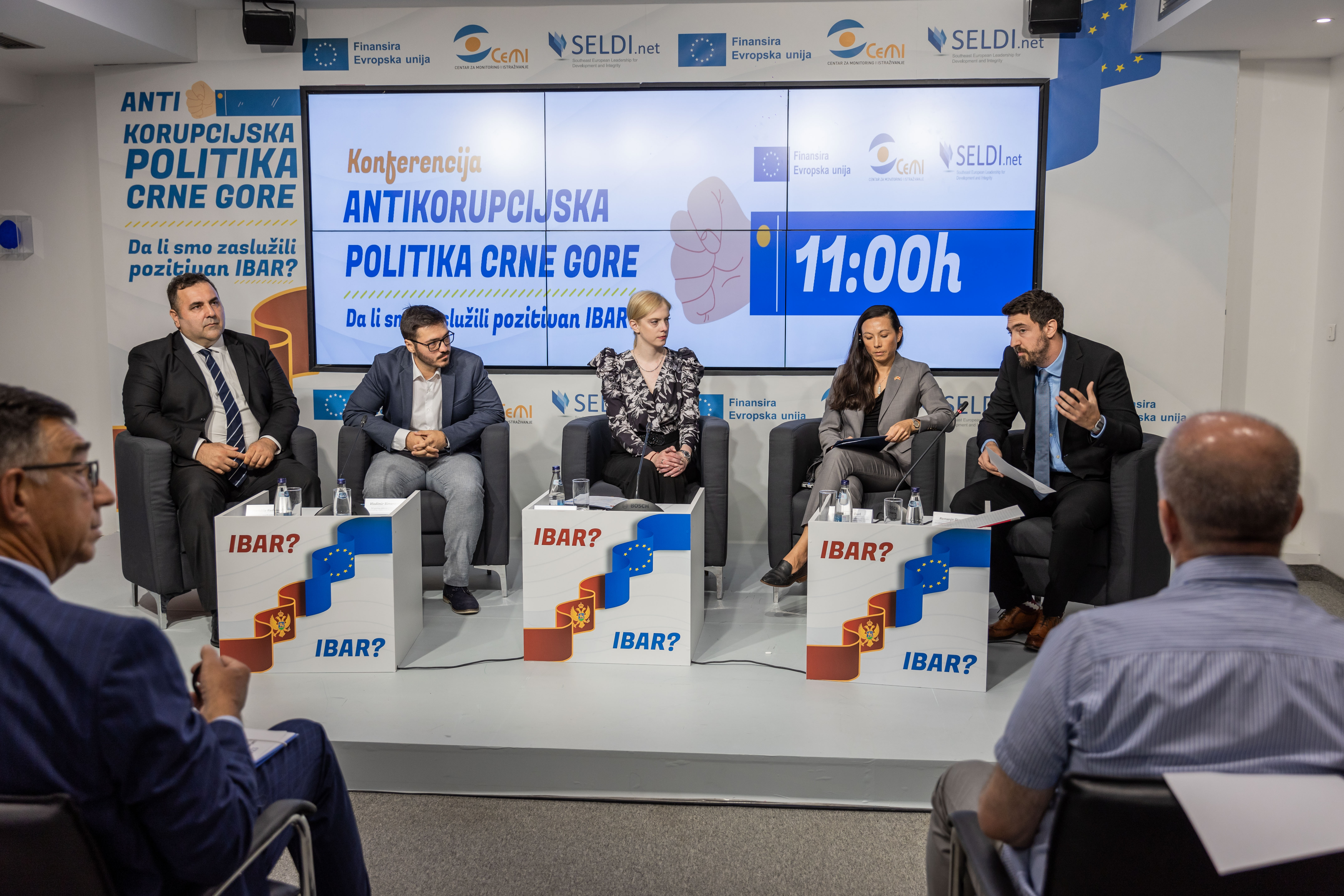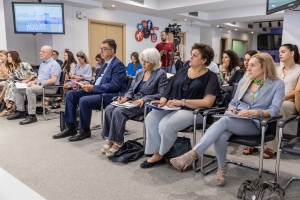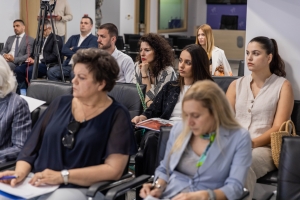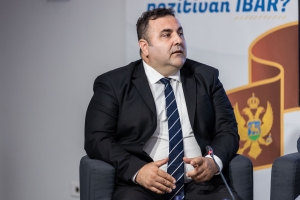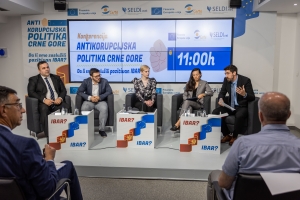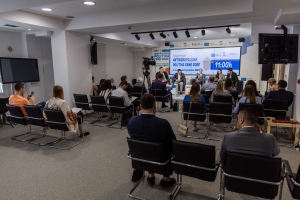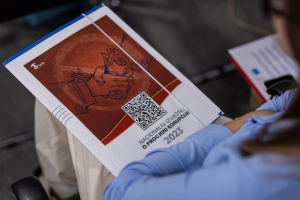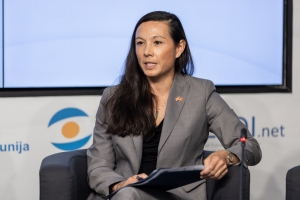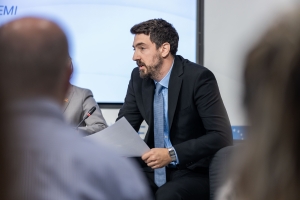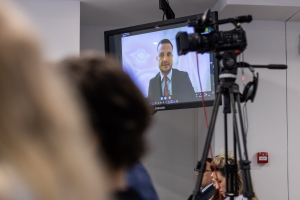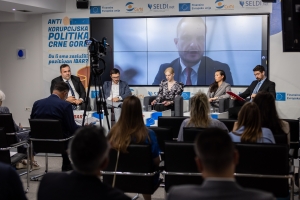Montenegro has made progress in the fight against corruption, but further reforms and stabilization of the institutional system are necessary, given that more than half of the citizens believe that corruption is very widespread in Montenegrin institutions. This was announced at the conference "Anti-Corruption Policy of Montenegro - Have We Earned a Positive IBAR?", which we organized today.
Nemanja Stankov, Head of the Public Policy Research Department at CeMI, presented key findings from the public opinion research "Survey on Corruption and the Informal Economy: Opinions and Experiences," conducted in August 2023 using the unique SELDI methodology - Corruption Monitoring System (CMS).
"In the area of anti-corruption efforts, I would like to highlight that significant institutional progress was made in November and December 2023, when key appointments in the judiciary marked substantial steps towards normalizing the functioning of the judicial branch," said Stankov.
He stated that the appointments of the 7th judge of the Constitutional Court and three members of the Judicial Council created the preconditions for the implementation of the rule of law and consequently an effective fight against corruption.
"Following the reporting period, at the beginning of this year, the Supreme State Prosecutor was also appointed, thus completing the institutional structure of the prosecutorial organization. The recently adopted Anti-Corruption Strategy 2024-2028 has, after a long time, provided a strategic framework for the fight against corruption," Stankov noted.
He believes that the adoption of the popularly called IBAR laws in the Parliament further improved the legislative framework for chapters 23 and 24.
"CeMI welcomes this progress but recognizes that the situation in this area is still not at a satisfactory level, fully understanding that the reform process is long-term and that we face an intensive period of work on improving the institutional structure and capacities for the fight against corruption," said Stankov.
He pointed out that CeMI conducted a public opinion survey using the unique SELDI methodology for assessing vulnerability to corruption, explaining that they collected data on the perception and dynamics of corruption, (non)tolerance towards corruption, and personal experiences of respondents.
"In terms of corruption perception, the survey results show that 53.5% of respondents believe that corruption is very widespread in Montenegrin institutions. Regarding civil service positions, citizens perceive the highest prevalence of corruption among customs officers (19.3%) and police officers (19.1%), while in terms of public officials, political party leaders are at the top of the list with 24.7%," said Stankov.
Speaking about (non)tolerance towards corruption, Stankov said that 55.7% of respondents believe they would have to offer a bribe to solve a problem, but it is encouraging that 56.4% of them would not pay a bribe under any circumstances, and in a hypothetical situation, if they were in a civil service position, 77.2% of respondents would not accept a bribe if offered.
"In terms of personal experiences, it is encouraging that the vast majority of respondents have not been in a situation where they were directly or indirectly asked for a bribe. However, if you ask them about their experience with state institutions, they will say that in rare cases they have engaged in some corrupt act - 10.3% of respondents have done a favor, 12.6% have given a gift, and 8.3% have given money to solve a problem," said Stankov.
During the panel "National Corruption Assessment Report for 2023: Enhancing Anti-Corruption Policies – IBAR and the Way Forward":
Vladimir Simonovic, Head of the Legal Department at CeMI and a member of the National Council for the Fight Against Corruption, reminded that CeMI strongly supported the creation of the Anti-Corruption Strategy, expecting its adoption by the end of the previous year.
"However, the previous government did not take any action on this issue. The new government also did not start working on the strategy in time, resulting in a document created in just a few months, without a thorough analysis of priority areas," Simonovic pointed out.
Simonovic also highlighted the positive aspect of the strategy and its flexibility, which allows for the expansion of areas of special risk for corruption after an annual analysis, noting that the document focuses on the judiciary, police work, customs, urban planning, public procurement, local self-government, and state enterprises.
"The scope of this strategy depends on the political will to implement reforms. The problem of lack of transparency and effective control of political party financing is one of the key challenges. Amendments to the Law on Financing Political Entities and Election Campaigns have not occurred since 2020, despite obvious shortcomings," Simonovic pointed out
He explained that CeMI identified the misuse of state resources as a specific form of political corruption characteristic of transitional countries.
"Misuse has been recorded during all elections, including last year's presidential elections, highlighting the need for urgent resolution of this problem," said Simonovic.
He emphasized the need for a serious approach when drafting a new Law on Financing Political Entities and Election Campaigns, avoiding half-measures and meeting only the minimum EU requirements.
"If there is political will now, that potential should be fully utilized," Simonovic assessed.
Jelena Grdinic, General Director of the Directorate for Criminal and Civil Legislation at the Ministry of Justice, highlighted key steps and changes that the ministry has implemented to improve the legislative framework for fighting corruption.
She explained that these measures are part of efforts to meet interim benchmarks in Chapter 23 of the EU accession negotiations.
"The Ministry, with the support of the Council of Europe and in consultation with the European Commission and the Venice Commission, has made significant amendments to legislation related to whistleblower protection," said Grdinic.
She pointed out that at this moment they could improve existing provisions, but the plan is to draft a specific Whistleblower Law.
"One of the most important novelties is the introduction of judicial protection for whistleblowers, which was not previously provided by law. This will enable more effective implementation of recommendations and increase citizens' trust in the system. The new law allows for internal reporting (to the employer) and external reporting (to the Agency for the Prevention of Corruption), as well as public disclosure of irregularities, which will further empower individuals reporting corruption," Grdinic noted.
According to her, the issue of the deadline for initiating proceedings attracted public attention, stating that after consultations, it was decided to extend the deadline to ten years to enable more effective verification of reports and asset and income declarations of public officials.
"Also, the Agency for the Prevention of Corruption is allowed access to public officials' bank accounts, increasing transparency and control over their asset declarations. The details of situations when this right can be used will be prescribed by secondary legislation. A clear categorization of public officials is also planned to precisely determine their rights and obligations, especially in the context of asset and income reporting," said Grdinic.
She stated that obligations for adopting integrity plans and integrity checks for candidates for directors of the Agency and council members were introduced, which is a recommendation from the Venice Commission.
"These changes are aimed at increasing efficiency and transparency in the fight against corruption, in line with European standards and directives," said Grdinic.
Jessica Carl, Director of the Rule of Law Program at the US Embassy in Montenegro, emphasized that assistance in the fight against corruption is one of the embassy's main priorities.
"Since December 2021, when President Biden announced the first US Strategy for Combating Corruption, corruption has been recognized as a key national security interest. This strategy connects security and anti-corruption efforts, highlighting the importance and resilience of democratic institutions," said Carl.
She believes that corruption hinders economic growth, destabilizes governments, fuels global insecurity, and undermines basic services, weakening citizens' trust in institutions and undermining democracy.
"The US and Montenegro work together to address these issues, as they are stronger as partners sharing experiences and establishing regional and international cooperation networks. Montenegro is a significant US ally, partner, and EU membership candidate, as well as an important recipient of US assistance," said Carl.
She pointed out that the focus of US assistance is on strengthening the capacities of national institutions in fighting serious crime.
"The capacities of specialized state prosecutor's offices and police units for combating corruption have been increased, specialized teams of prosecutors and inspectors for high-profile corruption and organized crime cases have been established," said Carl.
She stated that the US supports the role of civil society in anti-corruption processes.
"Civil society is crucial in prevention and accountability, and cooperation with it is key to improving the rule of law. Civil society organizations contribute to raising awareness, prevention campaigns, participation in policy-making, and monitoring the implementation of anti-corruption measures," said Carl.
She emphasized that the US, in coordination with international partners and the Montenegrin government, continues to provide technical and expert support, equipment donations, and training to strengthen the capacities of the judiciary, judges, prosecutors, and police officers.
"The goal is a long-term systematic solution that will support Montenegro's path to the EU," Carl emphasized.
Predrag Zenovic, Chief Negotiator at the National Office for Negotiations on Montenegro's Accession to the European Union, highlighted via online inclusion that the country has made significant progress in fighting corruption and deservedly received the IBAR.
According to him, with advice from the European Commission and other relevant bodies, Montenegro has managed to draft legal solutions that received the green light from the European Commission.
"Corruption and mechanisms to combat it are key aspects of chapters 23 and 24 in the EU accession process. Significant strides have been made in legislation, such as the autonomy of the Agency for the Prevention of Corruption and direct access to bank accounts without the owner's permission," Zenovic believes.
He pointed out that Montenegro had not had a strategic framework for fighting corruption since 2014, relying instead on action plans.
"The recently adopted strategic document represents an important step forward. The fight against corruption in Montenegro is systemic and further improvement of legislation and implementation of anti-corruption policies will be needed to achieve concrete results," said Zenovic.
He emphasized the importance of education and continuous work on improving the institutional framework.
He also assessed that Montenegro deservedly received a positive evaluation from the European Commission, but that there is still much work ahead to demonstrate the implementation of legal solutions and achieve clear results in the fight against corruption.
The President of the European Movement in Montenegro, Momcilo Radulovic, highlighted that corruption in Montenegro is not only an institutional problem but also a result of historical, social, and cultural heritage.
Radulovic particularly pointed out the necessity of strengthening the legislative framework and the efficiency of institutions dealing with the fight against corruption.
He mentioned the example of the Law on Prevention of Corruption, for which initiatives for amendments have existed since 2019, but were only recently adopted.
"All that was needed was a bit of political will from all political entities to adopt very significant solutions in the law much earlier," said Radulovic.
He pointed out problems in the functioning of the judiciary and prosecution, stating that the overload of judges and poor working conditions are major challenges.
"The number of judges will not increase in this way; it will only decrease. The number of cases will not decrease; it will only grow. And what will happen? You will face the complete collapse of the judicial system," warned Radulovic.
He assessed that, although there is strong political will from the European Union to push Montenegro towards membership, the key to success lies in internal reforms and coordination among institutions.
"Institutions cannot be misused for political and party purposes, nor for personal vendettas," Radulovic stated.
The event was held within the framework of the project "Civil Society for Good Governance and Anti-Corruption in Southeast Europe: Building Capacity for Evidence-Based Advocacy, Policy Impact, and Citizen Engagement (SELDI.net)" financially supported by the Delegation of the European Union.
